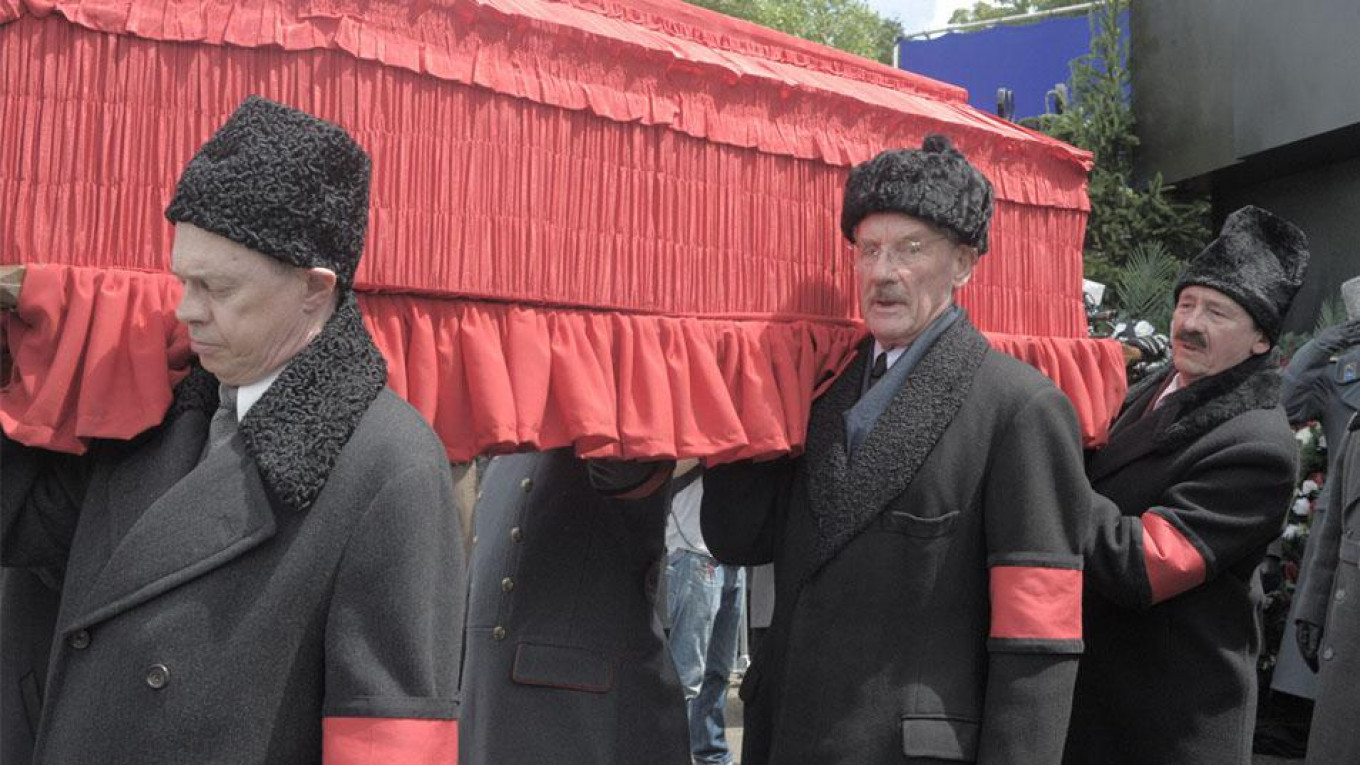Four people walked out of the cinema halfway through the film. And four times the audience broke out into spontaneous, if scattered, applause.
At the Pioner Cinema, a historic movie theater that shows art-house and foreign films without dubbing, Moscow’s first screening of “The Death of Stalin” was sold out and overbooked, with all the seats filled and people sitting on the steps. The audience of Russian viewers was mixed, with most people under 40 but some senior film-goers, too.
And the audience reaction to the film was somewhat mixed as well. “I wanted it to be funny,” Daniil, 43, told The Moscow Times. “There were many attempts to make Stalin funny, but [the reality of Stalin] was so scary and frightening, it’s just impossible to make it funny.”
Another viewer disagreed. “I cannot tell about the accuracy of the whole thing, but it was funny,” said Alyona, 32. “First, I didn’t want to laugh — I didn’t know if that was okay. But, it was funny, so I just enjoyed it.”
It took a few minutes for the audience to get into the comedy. After Stalin’s body is found, his men gather together, each nearly prostrate in an exaggerated show of grief. “We should call a doctor,” Nikita Khrushchev (played by Steve Buscemi) says. “All the best doctors are dead,” Kaganovich (Dermot Crowley) replies. And it’s a good thing too, someone adds; what if a good doctor manages to wake him up? At that, the audience burst out laughing.
The audience also laughed heartily at Stalin’s children, the practical and skeptical Svetlana (Andrea Riseborough) and her brother Vasily (Rupert Friend), who played the part like a drunken British lad. “I know the drill,” says Vasily at his father’s funeral. “Smile, shake hands and try not to call them c--ts.”
The portrayal most criticized officially was that of Marshal Georgy Zhukov, played by Jason Isaacs, who strides in, swishing a cape to the sound of ominous music. “I’m smiling, but I’m very furious,” he warns. The audience members did not appear to be offended.
“I don’t know why they’re making such a big deal out of Zhukov’s character,” says Svetlana, 27. “Was he a jerk? I don’t know. Was he depicted as a jerk? A bit, but it’s satire. I don’t think this was done on purpose to hurt the feelings of Russians.”
“Of course there are moments in the movie that were exaggerated!” said Liza, 29. “The movie is about a war-time period, and they were openly laughing about it, so I can understand why the Culture Ministry would want to ban it.”
While several scenes were met with silence and the odd grimace, the Russian audience clearly knew what they’d signed up for, and for the most part they greeted the movie with amusement and outright delight.
“Whoever says that these things were not happening just doesn’t want to admit it,” says Sergei, 41. “The movie was amazing.”
Meanwhile, the comedy has spilled over into real life. While Olga Lyubimova, acting head of the film department of the Ministry of Culture, announced that the screening certificate for the film had been pulled, Culture Minister Vladimir Medinsky said in October that it was against the law to revoke a screening certificate once it had been given.
Right now, that means that the run at Pioner probably won’t be stopped. That’s the good news.
The bad news? All the shows are sold out.
Maria Tsnompilantze contributed to this report.
A Message from The Moscow Times:
Dear readers,
We are facing unprecedented challenges. Russia's Prosecutor General's Office has designated The Moscow Times as an "undesirable" organization, criminalizing our work and putting our staff at risk of prosecution. This follows our earlier unjust labeling as a "foreign agent."
These actions are direct attempts to silence independent journalism in Russia. The authorities claim our work "discredits the decisions of the Russian leadership." We see things differently: we strive to provide accurate, unbiased reporting on Russia.
We, the journalists of The Moscow Times, refuse to be silenced. But to continue our work, we need your help.
Your support, no matter how small, makes a world of difference. If you can, please support us monthly starting from just $2. It's quick to set up, and every contribution makes a significant impact.
By supporting The Moscow Times, you're defending open, independent journalism in the face of repression. Thank you for standing with us.
Remind me later.







